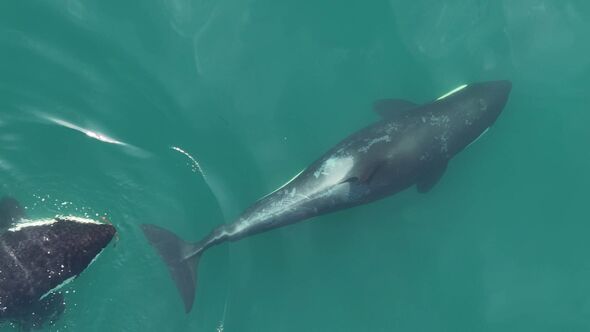
Orcas have demonstrated remarkable problem-solving skills by using seaweed as grooming tools, according to a recent study. A collaborative effort between the Centre for Whale Research and the University of Exeter has revealed that these marine mammals engage in complex grooming rituals, employing pieces of kelp to enhance social bonds and possibly improve their skin health.
The study, published in the journal Current Biology, details observations of orcas in the Salish Sea, particularly southern resident killer whales. Researchers documented these whales crafting massage tools from seaweed, a behavior characterized as “allokelping.” This process involves two whales working together to select and manipulate kelp, leading to extended grooming sessions.
Groundbreaking Observations of Orca Behavior
Lead researcher Dr. Michael Weiss expressed his astonishment at the sophistication of this behavior. While orcas are known for engaging in “kelping,” which involves playing with seaweed, the discovery of allokelping signifies a deeper level of social interaction. Dr. Weiss noted that the physical properties of bull kelp, which is both firm and flexible, make it an ideal grooming tool. He remarked, “I suspect these features make it an ideal grooming tool.”
During the study, the research team observed allokelping on eight out of twelve days, indicating that this behavior is prevalent among the population. Notably, orcas of all ages and both sexes participated, reinforcing the notion that this activity is integral to their social lives. Dr. Weiss emphasized that “all evidence points to it being an important part of their social lives.”
Enhanced Observation Techniques Reveal New Insights
Postgraduate student Rachel John from the University of Exeter highlighted the significance of advancements in technology for these findings. She stated, “This population of whales has been formally studied for 50 years – the best-studied orcas on the planet – and yet major new discoveries can still be made.” The improved quality of drone footage has allowed researchers to capture these intricate behaviors in detail, enabling a better understanding of orca social dynamics.
Professor Darren Croft, executive director of CWR, commented on the importance of touch in the orca’s social interactions. He drew parallels with primates, explaining, “We know touch is really important. In primates – including humans – touch moderates stress and helps to build relationships.” This observation suggests that the use of kelp during grooming may enhance social connections among orcas, reinforcing communal ties.
As scientists continue to explore the complexities of orca behavior, the discovery of allokelping represents a significant advancement in our understanding of these intelligent creatures. The implications of this research may offer insights into the evolution of social behaviors in marine mammals, further highlighting the intricate lives of orcas in their natural habitat.






